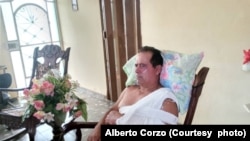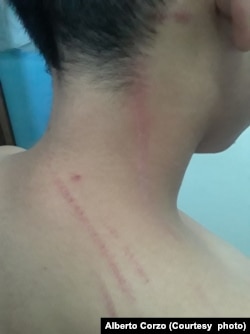Alberto Corzo did not anticipate any problems when he headed out on a reporting assignment earlier this month. But the Cuban journalist quickly found himself tailed by security agents, beaten to the ground and nursing a broken collar bone in a hospital.
The first sign that something was amiss came when two state security agents stopped Corzo in the street in Matanzas, a province of Cuba, and demanded to know where he was going.
Corzo, who is executive director of the independent Cuban Institute for Freedom of Expression and the Press (ICLEP), refused to answer the agents' questions. Instead, he got into a taxi that drove him away.
While in the taxi, Corzo said he noticed two men dressed in civilian clothing following on motorbikes. When he stopped and got out of the cab, they approached.
“They attacked me and hit me to the ground. Thanks to the help from some passers-by, these people left me alone. The car driver took me to hospital,” Corzo told VOA in an interview.
In an unrelated case a few days later, Yoandi Montiel Hernández, a social media influencer known as “El Gato de Cuba,” was sentenced to two years in prison over comments made about the president and senior officials. He was charged with contempt.
The cases show the dangers for those voicing independent views in Cuba. Harassment and arrests have increased since a protest movement took hold in 2021.
For Corzo, the assault on April 1 is not the first time he and his family have been targeted.
Both he and his wife Martha Liset Sánchez are independent journalists who report on efforts by the government to curtail freedoms, including for the media.
Like other journalists who are not aligned to the government, the couple have been subjected to physical attacks and legal action. Corzo said he has been physically attacked 33 times. His wife, who works for the local newspaper Cocodrilo Callejero, or Street Crocodile, has been assaulted on about 25 occasions.
Even their son was targeted. In April 2021, a teacher and another women encouraged children to attack the couple’s son Raidel, Corzo said.
“My son has to be treated by a psychiatrist for an obsessive [compulsive] order because of this,” Corzo told VOA.
The journalist said he complained to the police and the school, but no action was taken.
Neither Havana’s official media center, the International Press Center nor the Cuban Embassy in Madrid replied to emailed requests for comment on the assault on Corzo or the imprisonment of Hernández.
Legal threat
In the case of the social media influencer, the sentencing came nearly a year after Hernández was detained.
Osmay Pérez, a spokesman for Hernández's YouTube channel, told VOA the popular influencer was arrested on April 12, 2021.
At the time, his video blog El Gato de Cuba – Spanish for the Cuban Cat - had more than 74,000 followers on YouTube and 144,000 on Facebook, Reuters reported.
In 2020, the 35-year-old started broadcasting what were intended to be funny commentaries about day-to-day life in Cuba.
In many of his posts, he is seen in bed joking about the issues that concern most Cubans.
Prisoners Defenders, a Madrid-based nonprofit rights organization, said because of Hernández's growing influence in the protest movement in 2021, security agents initially tried to recruit him to support the Cuban government.
State security questioned Hernández on March 5, 2021, and they “repeatedly threatened and then tried to recruit him, to which Yoandi flatly refused,” Prisoners Defenders told VOA in a statement.
“Hernández said he had no interest in working for the political police and that all he was doing was exercising his right to freedom of expression.”
The following month, some 20 officers raided Hernández's house in Havana at 6 a.m., Prisoners Defenders said.
Maria Hernández, the influencer's mother who lives in Conroe, Texas, told Radio Marti her son's imprisonment was “unjust.”
“He was just a YouTuber who said everything that is happening there, telling the truth … And just by telling the truth, look what they have done to him,” she said.
Radio Marti and Television Marti, which like VOA is part of the U.S. Agency for Global Media, broadcasts to Cuba from Miami.
Javier Larrondo, of Prisoners Defenders, says the case is “nothing more than part of a systematic persecution, arrest and imprisonment of a very popular media voice who is critical of the government.”
He added that the conviction “is also incompatible with international standards as already indicated by the Working Group against United Nations Arbitrary Detention.”
Prisoners Defenders reported last week that Cuba has detained 1,027 people between March 2021 and April 2022. Of these, 894 were related to protests in July. The figure includes journalists.
The communist government has said the U.S. government orchestrated the protest movement and that recent protests failed because of a lack of popular support.
Road to recovery
Journalist Corzo told VOA that during the attack earlier this month, his assailants did not say anything or take any of his possessions.
“Thanks to the intervention of passersby, I was taken to Mario Muñoz Monroy Hospital in Matanzas province, [but] doctors could not carry out the necessary examinations because of lack of materials,” the journalist told VOA.
His brother took him to another hospital, where doctors diagnosed a dislocated collar bone. He was discharged on April 5.
Despite everything he has been through, Corzo said he is determined to keep reporting.
Speaking to VOA via phone from his home in Cuba, Corzo said, “I am pleased that some media can publicize the attack that I was subjected to, and the world gets to know what the dictatorship is capable of.”






